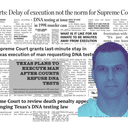Shafer v. South Carolina, 00 – 5250
In a 7 – 2 vote, the Court re-affirmed that defendants facing the death penalty have the right to inform jurors when a life sentence would include no possibility of parole. The Court found that Wesley A. Shafer’s right to due process was violated when a South Carolina trial judge refused to clarify for jurors that, if they sentenced Shafer to life, he would have no possibility of parole. Justice Ginsburg, writing for the majority, stated that the jury was obviously confused about the meaning of a life sentence under South Carolina’s new law because they sent a note to the trial judge asking if there was “any remote chance” of parole. In response, the trial judge instructed the jury that “parole eligibility or ineligibility is not for your consideration.” The jury then sentenced Shafer to death.
The decision reiterates the Court’s 1994 ruling in Simmons v. South Carolina, holding that whenever the prosecution makes an issue of the defendant’s future dangerousness, the defendant has the right to an accurate jury instruction that a life sentence means no possibility of release. (New York Times, 3/21/01) Shafer’s case was remanded back to South Carolina to determine whether future dangerousness was, in fact, argued by the prosecution.
Texas v. Cobb, 99 – 1702
In a 5 – 4 ruling, the U.S. Supreme Court held that police did not have to notify Cobb’s lawyer when they questioned him about one crime while he was under indictment for a related crime. In 1993, Raymond Cobb confessed to the burglary of his neighbor Maggie Owings, but denied involvement in the disappearance of her and her daughter. While awaiting trial, the police questioned Cobb about the disappearances without notifying his lawyer. Cobb was subsequently convicted and sentenced to death. The conviction was overturned by the Texas Court of Criminal Appeals which held that the police should have notified Cobb’s attorney before questioning him.
The U.S. Supreme Court, however, reversed the Texas Court holding that the burglary and the killings were separate crimes and a lawyer working on one case is not automatically the lawyer for the second case. The dissenting justices argued that the police were required to notify Cobb’s lawyer when investigating him in the killings and that the majority’s decision “undermines Sixth Amendment protections while doing nothing to further effective law enforcement.” (Associated Press, 4/3/01)
Penry v. Johnson, 00 – 6677
The U.S. Supreme Court held that a sentencing jury considering the death penalty must be given proper instructions about how to weigh mental retardation as a mitigating factor. The decision overturned the death sentence of John Paul Penry, a Texas death row inmate suffering from mental retardation, and sent the case back to the trial court for re-sentencing. The Supreme Court first decided Penry’s case in 1989, and held that, although executing those with mental retardation was not a violation of the Eighth Amendment, Penry’s rights were nevertheless violated because the sentencing jury was not properly allowed to take his mental capacity into account. At retrial, Penry was again sentenced to death. (CNN.com, 6/4/01)



